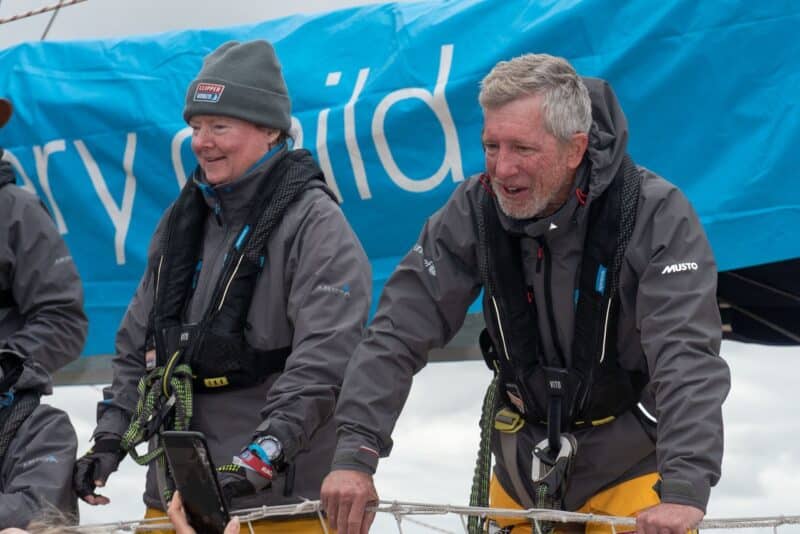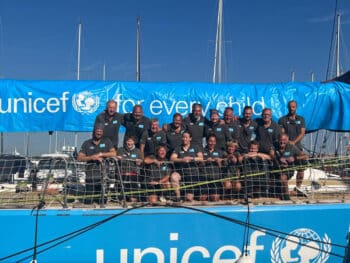NEWS
Davidson Resident, Greg Scoggins, Accomplishes the Race of a Lifetime

Greg Scoggins, on right
A Davidson resident spent some time last week getting steady on his feet again after completing his dream of making an ocean-to-ocean sailing “passage.”
“It does take the legs 24 to 48 hours,” said Greg Scoggins, a retired 65-year-old sales executive and resident of River Run. Scoggins was an experienced big boat sailor, but he never found the time and means to achieve the sailor’s dream of a passage of sailing from one ocean to another. By chance, he found a web site for the 40,000 mile, Clipper Round the World Yacht Race and recognized it as a bucket list opportunity. The boats had been docked in the Philippines for two years because of Covid, but in March 2021 were being checked out and made ready to go again.
 The Clipper race is a biennial event that takes paying amateur crews on one or more legs of a competitive circumnavigation of the globe in identical 70-foot ocean-going boats, owned by the British firm Clipper Ventures. Professional skippers and highly trained mates led Scoggins and 18 crew members in the 10-month journey in a boat representing UNICEF, the only charity affiliated boat in the race. In addition to racing for pride and glory, entrants raised money for their boat, and the UNICEF boat ended up ahead in that category, raising $1 million for their charity.
The Clipper race is a biennial event that takes paying amateur crews on one or more legs of a competitive circumnavigation of the globe in identical 70-foot ocean-going boats, owned by the British firm Clipper Ventures. Professional skippers and highly trained mates led Scoggins and 18 crew members in the 10-month journey in a boat representing UNICEF, the only charity affiliated boat in the race. In addition to racing for pride and glory, entrants raised money for their boat, and the UNICEF boat ended up ahead in that category, raising $1 million for their charity.
The boats sailed to eight ports during their 40-day ordeal. The overall winning boat represented the Chinese sailing city of Quingdao. The UNICEF boat won only a single leg, but it was the 3,000 mile, 14-day final leg from New York City to Great Britain and London, where they were greeted by tremendous crowds in a “Parade of Sail” up the Thames River. Scoggins was proud to have sailed the Hebrides Islands where the Atlantic meets the North Sea, through a tight passage that included not only tricky tides, but man-made obstacles like oil rigs, wind farms, fishing boats, and commercial cargo ships.
Scoggins said crew members’ primary job was raising and lowering sails to take advantage of the wind. The sails were heavy, weighing up to 8,000 pounds, and sail changes were made constantly through the day and night. It typically took five people to change sails. In the cramped and typically wet cabin of the boat, members of the crew traded off cooking duties and sleeping rotations.
No one in the UNICEF boat fell overboard, but safety procedures were constantly practiced. When they were on deck, crew members were required to be clipped into straps and harnesses as they passed over and below each other. Each crew member wore a complex wet suit costing $2000, to assure that if someone fell off, they stayed connected to the boat. Various electronic buoys and gear were also available for navigation and safety purposes.
Scoggins said that just moving around the boat was hazardous and difficult. “You’re burning calories and don’t even realize it,” he said. “You might get three evolutions on your watch where you have to shove an 800-pound head sail through the forward hatch to get it on deck to hoist it up the 95-foot mast. That is a lot of work. I lost six pounds.”
Scoggins might have lost six pounds, but he gained a world of experience and contributed to raising $1 million for a great cause in the process.
+++++++++++++++++++++++++++
Bill Giduz was the son who followed his father’s footsteps into journalism. He has been involved his entire life with news and photography in schools he attended and jobs he’s held. He believes now that he’s got a few good years left to devote to The News of Davidson.


